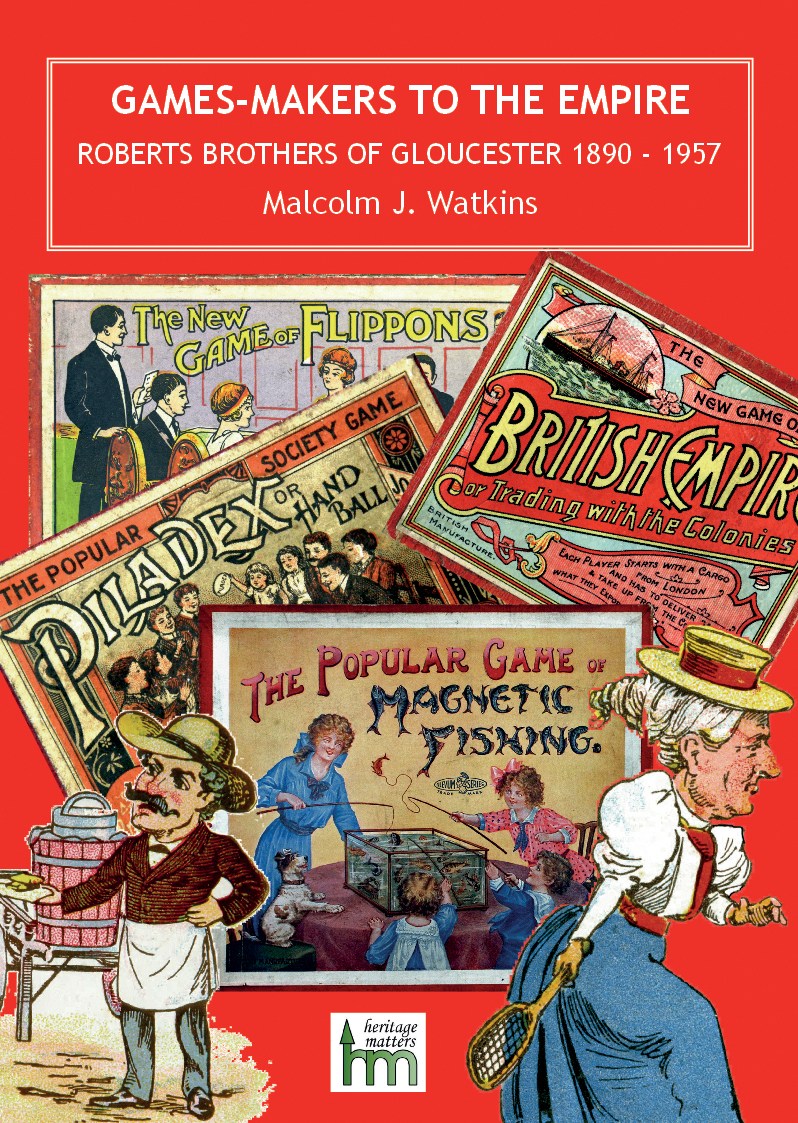At long last the book about Roberts Brothers, whose main trade mark was 'Glevum', has been published.
Games-Makers to the Empire: Roberts Brothers of Gloucester, 1890 - 1957
573 pages including 242 colour plates of products, 70 colour plates of rules and instructions and numerous black and white images in the text.
ISBN 978-0-9575581-0-6 published by Heritage Matters, priced at £70.
Available from good booksellers and online.
This massive book should be of benefit to games collectors, local historians and almost every museum with local history collections. It describes the comapny recognised as one of the world's biggest makers of games and toys in the first half of the 20th century. The range of products issued over a period of nearly 70 years was astounding, and even now the author admits that he has not seen or examined examples of many of them, despite the large number he has recorded in the book.
The fruit of study and research over more than ten years, “Games-Makers to the Empire: Roberts Brothers of Gloucester, 1890 – 1957” is the first attempt for nearly a century to describe a company which at one time carried the name of Gloucester into parlours and nurseries around the world, and perhaps the first book to look in such detail at the products of any games company.
The Roberts Brothers began their international business on the kitchen tables of houses in Southgate Street and Commercial Road, Gloucester, England. Within a few years they built a cutting-edge factory complex in the city in Tredworth. At its height the firm employed more than 750 people – a significantly large part of the workforce available – and had agencies and offices around the world. Roberts Bros. specialised in games and toys, but also at various times made dolls, soft toys, children’s furniture, dolls’ furniture and dexterity puzzles. By the outbreak of World War II the catalogue extended to 117 pages and nearly 400 titles, but of course others had been introduced and dropped over the period since the company was formally founded in 1894.
Harry Owen Roberts patented the parlour activity game of Piladex in 1890. It involved teams batting a balloon across a string using only their hands. Within a short time the game took off, and H.O. Roberts began to seek legal protection for other games he invented. In 1894 he joined with his brother, John Owen Roberts, to form a company specialising in games and toys. The two brothers were soon able to leave their existing jobs to concentrate on developing the business, which they spread across the world.
In the middle years of the 20th century probably every home in Gloucestershire would have had at least one Roberts game. The products, which they marketed under the trade name of Glevum, included some which could be bought as cheaply as a penny, although others were priced much higher.
The company merged with Chad Valley in the 1950s, largely due to problems caused by World War II, ending the story of a local company that had been both innovative and successful.

Hello, Malcolm!
ReplyDeleteI bought your Roberts/Glevum book (an amazing 573 pages, filled with considerable information!) and it arrived today via Amazon at my home. There's lots of info there. I have been reading it throughout and have been noting items I would like to pursue with you further. My core research and collection area is in the game of tiddlywinks. However, one of my extended collection areas is in British 1920s-to-1930s skill and action games, and Glevum is famed for that.
In reading your book I am assembling a number of questions for you and/or others. I am very familiar with the Games Board (having met in person with Richard Ballam and Jeremy Secker and Michael Thomson, plus also Dave Deayton & Geraldine Goodwin who are fellow AGPC members) and I have also performed research at the UK National Archives. I am, of course a citizen of the USA!
All the best,
- Rick
RickTucker@alum.mit.edu